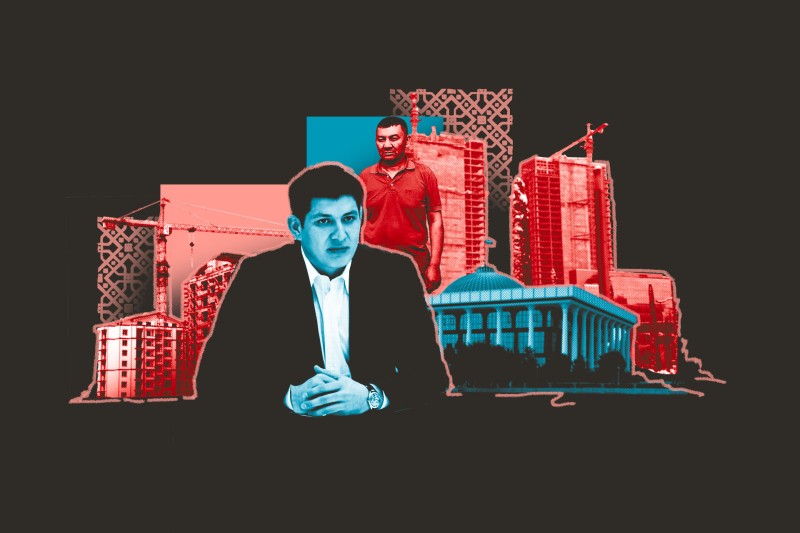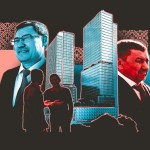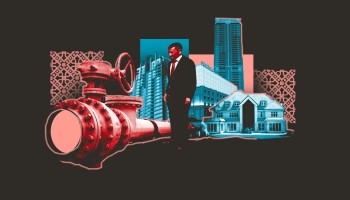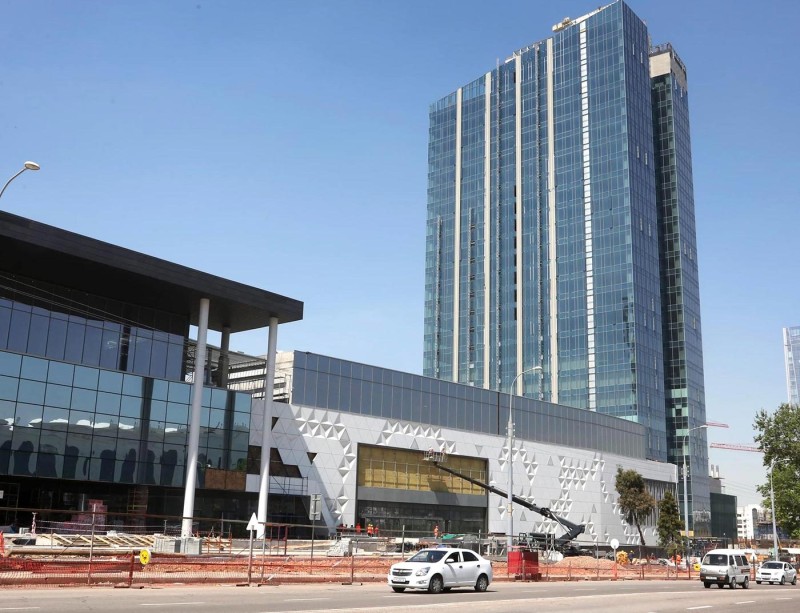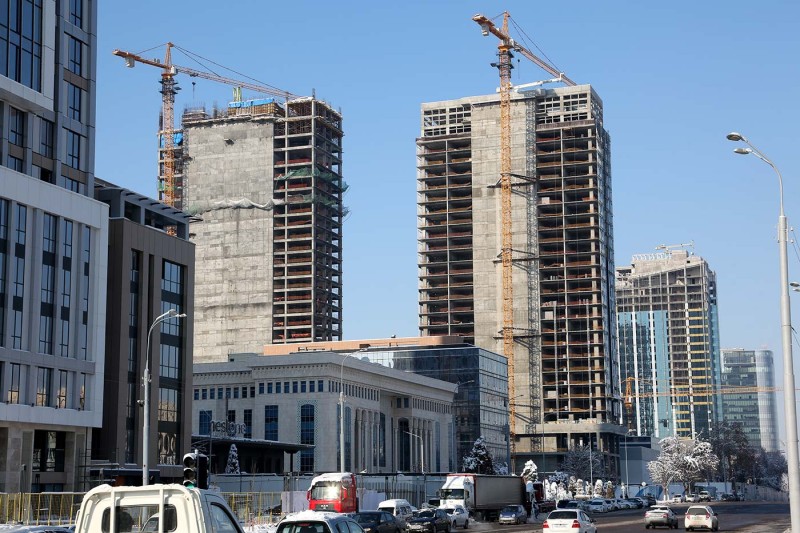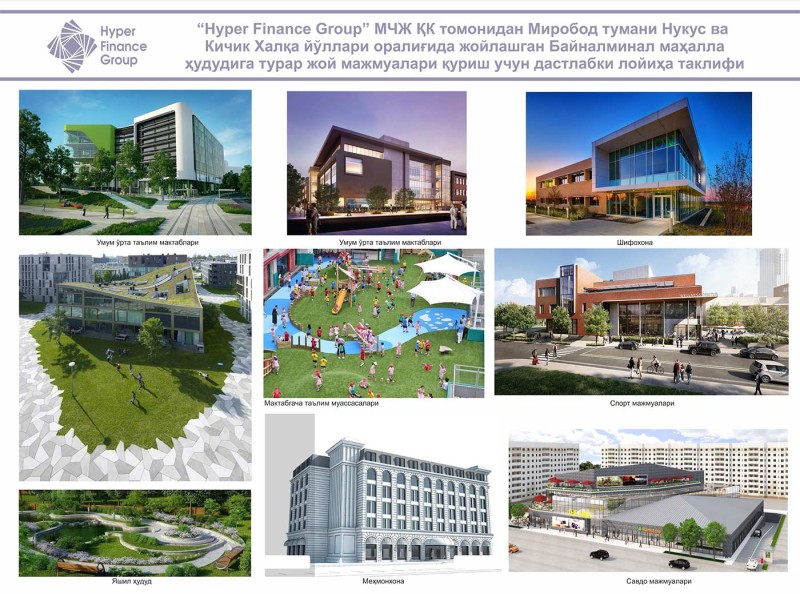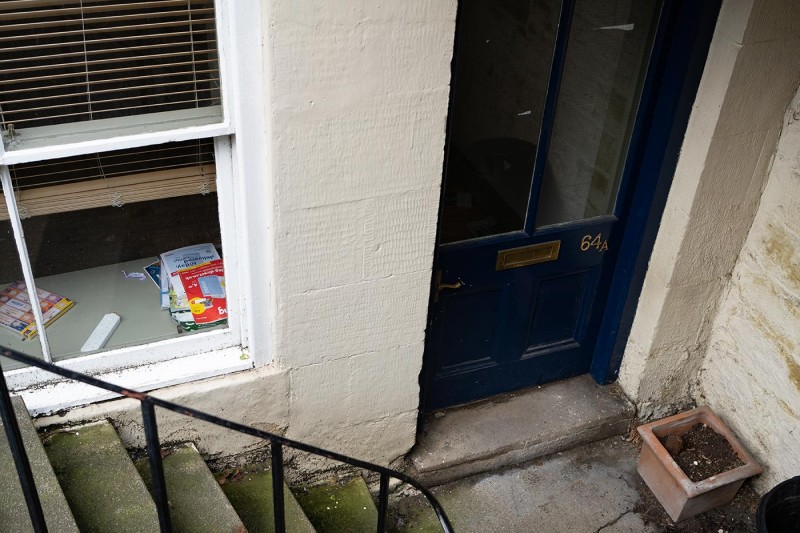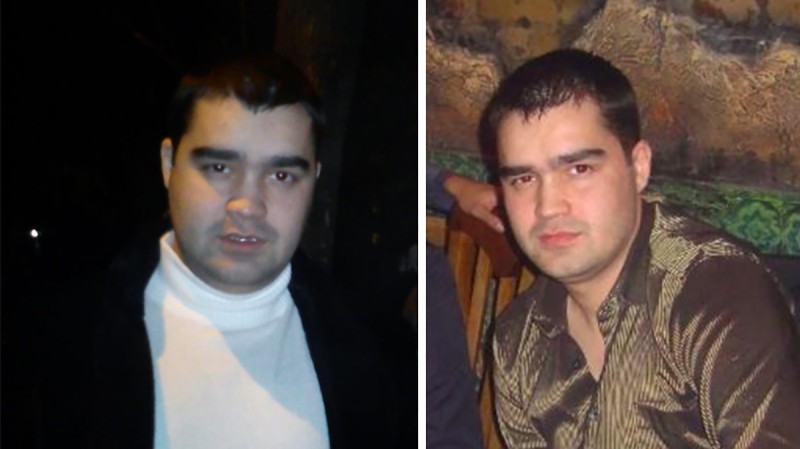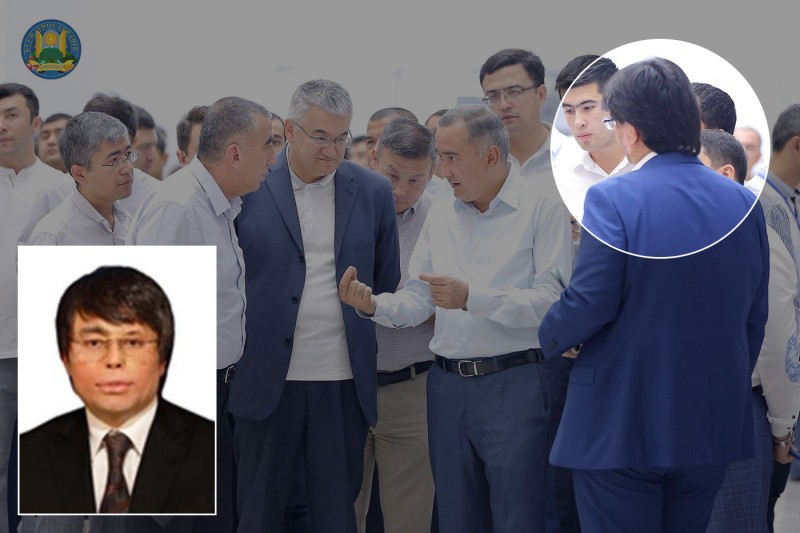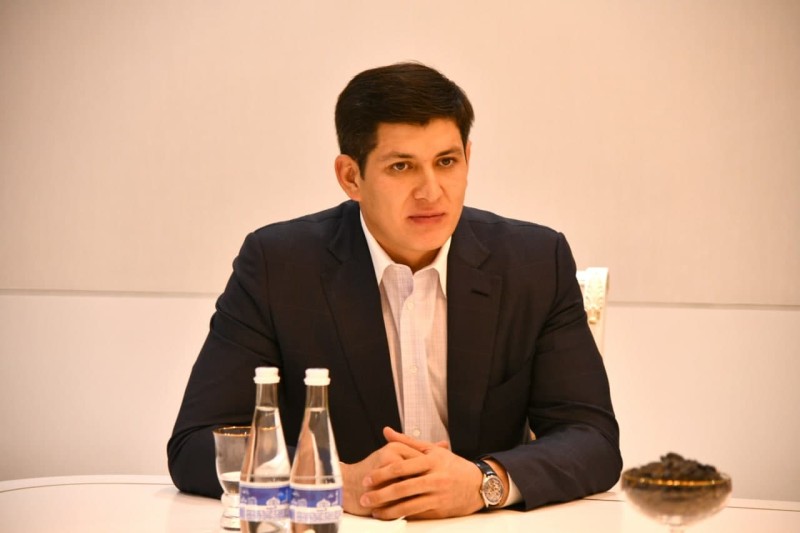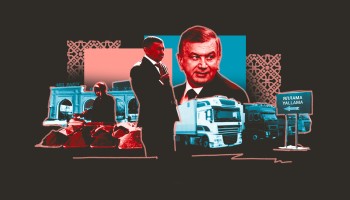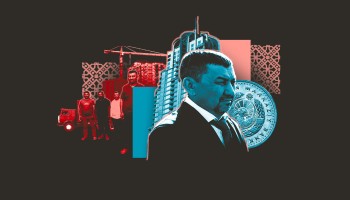For centuries, Uzbekistan’s ancient capital of Tashkent has been known for its medieval mosques, lively bazaars selling spices and textiles, and sprawling, warren-like neighborhoods known as mahallas. But President Shavkat Mirziyoyev, who took power in 2016 promising to modernize this Central Asian country, is on a mission to transform these old neighborhoods into high-rise apartment buildings and shopping malls.
A $1.3 billion project called Tashkent City is the centerpiece of that transformation, with 80 hectares of parks, international restaurants, modern high-rises, and even a planetarium.
“The whole world will want to come here,” Mirziyoyev said in 2017, promising to keep personal tabs on its progress.
He has kept that promise, visiting the construction site on numerous occasions. But in footage of one of his inspection tours, touted in a state TV program last January, reporters spotted a familiar figure: A man dressed in a dark winter jacket, his face half-covered by a medical mask.
He was Khabibula Abdukadyr, the secretive Uighur tycoon who, along with his brothers, made a fortune running a trading monopoly, built on bribery and political patronage, that stretched across Central Asia. As it turns out, he and his family are the investors behind a $400-million development at the heart of Tashkent City that includes a shopping mall, residential and office towers, and a hotel.
Abdukadyr’s involvement — and his proximity to Uzbekistan’s president — is noteworthy considering that the family’s dealings had been revealed two years earlier in a series of reports by OCCRP, RFE/RL, and Kloop.
In neighboring Kyrgyzstan, the Abdukadyrs paid off customs officials who essentially placed their agency at the family’s disposal. Taking advantage of the resulting privileges, the family made vast profits by trucking tons of cheap Chinese goods into Kyrgyzstan, Uzbekistan, and beyond.
The story came to light when a self-confessed money launderer made contact with reporters, telling of the hundreds of millions of dollars he said he sent abroad for the family using a variety of illicit techniques, such as false contracts and loan agreements, fraudulent wire transfers, and even low-income men as cash mules.
Despite widespread coverage of his allegations, and the fact that much of the money he said he laundered originated in Uzbekistan, the family — whose members use multiple names and passports — have been welcomed back into the country as prominent foreign investors.
In addition to Tashkent City, they were also handed the rights to build two other major developments in the Uzbek capital that were projected to cost a total of $520 million. The family has also partnered with Accor, the French hospitality company, on a new five-star hotel in the city; two more are set to open elsewhere in Uzbekistan.
The Abdukadyrs’ investments in these high-profile developments are well-hidden, channeled through two secretive companies that are owned by shell firms or apparent intermediaries.
As a result, it took over a year for OCCRP and its reporting partners — RFE/RL, Kloop, and Vlast — to uncover definitive evidence of the family’s involvement. Reporters investigated the companies’ employees and nominal shareholders, cross-referenced corporate contact details with known Abdukadyr firms, and used other open information sources to track down knowledgeable insiders.
Information obtained by reporters also suggests that the Abdukadyrs have a powerful partner with close ties to the very top: Otabek Umarov, the influential son-in-law of President Mirziyoyev and deputy head of presidential security.
Umarov’s name does not appear in any of the paperwork, and Uzbekistan’s commercial registry does not list him as the owner of any other business. However, traces of his involvement can be seen not only in the Abdukadyr family’s Tashkent real estate developments, but in the dominant trading business they’ve also built in Uzbekistan — a business that takes advantage of multiple forms of state backing, including presidential decrees, pressure on competitors, and government tenders secured secretly in advance.
President Mirziyoyev has made repeated promises of reform and modernization, but his commitments are thrown into question by the Abdukadyrs’ success. Welcomed into Uzbekistan with open arms, a family accused of smuggling has made or committed investments in the country that now total over two billion dollars.
Kristian Lasslett, a professor of criminology at Ulster University who has studied the Abdukadyr family, recounted the costs of this kind of investment.
“We’re seeing a lot of the money that is coming from dubious sources being laundered into projects that are marked by destruction of national heritage, destruction of natural heritage.”
“And also, when these kinds of projects are being done, there’s often an expectation of kickbacks,” he said. “So on the one hand, these kinds of investments are priming human rights abuses. On the other hand, they’re adding blood into the veins of kleptocracy.”
Reporters sent over 50 requests for comment to the people, organizations, and government institutions named in this investigative series. Most did not respond, including President Mirziyoyev’s administration and Otabek Umarov. The Abdukadyr family acknowledged receiving questions from an email address known to be used by Khabibula Abdukadyr, but said they could provide information only at a later date.
In response to questions about Accor’s partnership with the Abdukadyr family, a representative said that the company “is aware of the [previous] OCCRP articles on Mr. Abdukadyr” and “has applied its due diligence policy regarding the hotel owners.”
A Phantom ‘Market Leader’
On its Instagram account, the shopping center in “Lot 3” of the vast Tashkent City development is already promoting the international brands that will sell their goods there, including Calvin Klein, United Colors of Benetton, and Swarovski.
But the company that built the mall and its adjoining high-rises, Hyper Partners, has always been a mystery. It was first publicly identified in June 2018, when a paid promotional article in an Uzbek news outlet named it as the project’s investor, describing it as a “market leader.”
The article didn’t mention that the company had been registered just four months earlier and had just 25,000 euros in founding capital.
These findings were reported in a December 2018 investigation by Open Democracy, which stated that Hyper Partners was then owned by an 18-year-old and had been founded by two German citizens with low public profiles who were linked to the then-little-known Khabibula Abdukadyr.
The story attracted enough attention that then-Tashkent Mayor Jahongir Ortiqkhojaev felt compelled to respond. At a news conference the following month, he defended the decision to award the development rights to such a major project to an obscure firm with questionable ownership. It didn’t matter “if this company was founded yesterday or the day before,” he said. “It’s not our responsibility to ask them who they are or where their money is from.”
“If we’re going to ask every investor who its beneficiary is, then you can just close the gates to Uzbekistan,” he said. “No one will come here.”
Within a year it became clear whom Uzbekistan had let inside its gates, when OCCRP, Kloop, and RFE/RL published the first investigative series about the Abdukadyr family and their alleged smuggling empire.
The fact that Hyper Partners is an Abdukadyr entity is now beyond any reasonable doubt. Corporate records show that it has been used as a holding company not only for Tashkent City but for several of the family’s other Uzbek investments, including multiple customs terminals and a cement factory under construction in the Jizzakh region.
Its German address is the same business complex where several known Abdukadyr companies are registered, including two — AKA Group and AKA Petroleum — that received tens of millions of dollars from their self-confessed money launderer. And in Uzbekistan, its local subsidiary shares both a physical address and an email address with several other Abdukadyr companies.
Mustafa Palvan, the young man who formally owns Hyper Partners, appears to be a member of the Abdukadyr family. According to German corporate records, his official address is the Abdukadyrs’ luxurious seven-bedroom home in the prestigious Coombe Park area of southwest London. His last name, Palvan, is also used by Khabibula Abdukadyr, several of his children, and one of his wives.
‘Those People Are Somewhere in the Sky’
Across the city, another old Tashkent neighborhood was also slated for redevelopment.
One concept for that district, to be called Mirabad City, was pitched to the mayor’s office by a local company called Elegant Perspective in July 2018. In an interview with local news media, the company’s owner, Makhira Tashkhodjayeva, told reporters that the city’s previous mayor had already given her the go-ahead to begin planning.
Tashkhodjayeva had even begun to meet with local residents whose homes would be demolished. But within a few weeks, everything changed. The mayor’s office suddenly awarded the land rights for the development to an obscure company called Hyper Finance Group.
“It’s a very emotional topic for me, I’m ready to cry again,” she told reporters of her fruitless attempts to have the decision reversed. “Those people don’t walk the same ground as us,” she said of Hyper Finance Group. “They never come to dusty construction sites or meet with ordinary people. Those people are somewhere in the sky.”
That September, Hyper Finance Group was allocated an additional plot of state land by Tashkent’s mayor who justified the move by citing an August decision by President Mirziyoyev. The size of the project grew from 30 to 50 hectares. Within days of receiving the land, a company representative was already fending off angry locals whose homes were slated for demolition.
On September 14, dozens of furious residents gathered around Farhod Tashtemirov, a bald, besuited man who had come as an envoy for the company. It was his job to explain why they were going to lose their homes.
“We have to make a modern city,” he told the angry crowd.
As the locals shouted Tashtemirov down, he pulled out a trump card, invoking the support of President Mirziyoyev. “There’s a presidential decree,” he said.
The audience appeared unmoved. “You don’t have the right!” one woman yelled.
The scene appeared in a November 2018 documentary by the BBC’s Uzbek service, which tried to pierce the veil of secrecy around Hyper Finance Group. The investigation revealed that the company’s majority shareholder was a Scottish shell company called 77 Corporation, registered at an address that also hosted over 3,300 others.
Hyper Finance Group’s second shareholder provided no further clues: Though the BBC report identified him as an Uzbek man named Zafar Mamajonov, it revealed little about his background. At some point after the story aired, Mamajonov gave up his Hyper Finance Group shares.
In the ensuing years, the mysterious investors behind Hyper Finance Group have remained unknown to the public, and the project has remained at a standstill.
“Everything is quiet again,” said one local woman. “We signed a petition against the demolition but we’ve heard nothing since.”
New Clues
In fact, the beleaguered Tashtemirov was one of the first clues that led reporters to the resolution of the Hyper Finance mystery. Even as he defended the company in front of angry residents, he was also operating a hotel in central Tashkent called Miran International.
At the time, Miran was a brand owned by the Abdukadyr family, making Tashtemirov their direct business associate. Tashtemirov did not answer reporters’ questions about his involvement with their projects, citing “commercial secrets” and noting that Uzbek legislation required no one to “present any information which could harm them, their property, or their interests.”
Another link between the Abdukadyrs and Hyper Finance Group appeared after reporters examined the company’s new shareholding structure, which changed some time after the BBC investigation. Among its new shareholders was a Turkish company owned by Dilsat Artis, an Abdukadyr associate who had received millions of dollars from the family’s self-confessed money launderer.
An Old Friend
Dilsat Artis was first brought to reporters’ attention by Aierkin Saimaiti, the Abdukadyrs’ self-confessed money launderer, whose revelations featured prominently in previous investigations.
Armed with these leads, reporters reached out to multiple individuals associated with Hyper Finance Group and obtained dozens of pages of internal documents from the secretive company.
Among them was an organizational chart showing the various corporate actors then involved in the Mirabad City project. It shows an Abdukadyr company called Tashkent Construction Development acting as both the customer and the general contractor. Though Hyper Finance Group was handed the rights to the land, the chart shows the development was an Abdukadyr project from the beginning. This finding represented the first documented proof reporters obtained of the family’s direct involvement with Mirabad City.
The Abdukadyrs’ Umbrella
The internal documents had more secrets to reveal.
They included weekly status reports showing that Hyper Finance Group was managing a number of other projects beyond Mirabad City: Two hotels, a tourism and cultural center in the historic city of Kokand, and the very same customs terminals, built in partnership with the Uzbek government and owned by the Abdukadyrs’ German company Hyper Partners.
These projects are owned directly or were developed by various Abdukadyr companies, indicating that Hyper Finance Group serves as a kind of umbrella management firm for some of the family’s biggest investments.
Under the Hyper brand, the Abdukadyrs have even managed to strike a deal with the French hospitality company Accor.
According to an Accor press release, the company signed a cooperation agreement with the “Hyper Group of Companies” under which the family’s Registan Plaza hotel in Samarkand will be rebranded as a Mövenpick, and its Miran International hotel in Tashkent, now under renovation, will reopen as a Swissôtel. Under the agreement, a third hotel is slated to be built in a lake resort area in the Tashkent region.
The press release quotes Accor executive Alexis Delaroff expressing his excitement about a “remarkable day” for the company. “I am grateful to our partners for their trust,” he says, “and I hope that together we will be able to implement many more exciting projects in the future.”
Accor has not publicly named the Abdukadyr family as its Uzbek partner. In response to requests for comment, Accor confirmed that the company has reached a franchise deal with three Uzbek hotels, and that one of them is owned by Registon Plaza, an Abdukadyr company. Accor did not deny partnering with the family.
Alexander Cooley, a political scientist and Central Asia specialist at Columbia University, said that when companies like Accor deal with opaque corporate structures, this “would typically, in terms of best practices, mandate additional follow-up and diligence on their part.”
This is especially true in a place like Uzbekistan. “[It’s] a country where just a simple Google unveils a history of grand corruption schemes,” Cooley said. “Ordinarily, that should flag that there should be enhanced due diligence performed on whatever local partners you're going to be engaging with.”
In its response, Accor wrote that it had “applied its due diligence policy regarding the hotel owners” and that the company “retrieves information from well-regarded international due diligence platforms which review applicable international sanction regimes and court convictions available on public sources.”
The company also confirmed, without further comment, that it was “aware” of OCCRP’s previous reporting on the Abdukadyr family.
An Influential Partner
With so many projects under its belt, Hyper Finance Group might be expected to be a large and professionally managed operation.
But its internal project status reports from 2018 pointed out a number of basic management problems, including “meetings happen[ing] spontaneous[ly with] no preparation [and] no documentation,” “common standards and procedures not implemented or even understood,” “no office manager [and] no secretary,” and even “architects [being] ordered to make tea” for a manager.
Hyper Finance Group does not appear to have a website — a previous one it used has been dead for several years — and Mirobod district residents complain that they cannot locate the company or its representatives.
An insider who cannot be named for fear of retribution said that no member of the Abdukadyr family took part in Hyper Finance Group’s day-to-day operations. Instead, according to the source, a leading role was played by a man named Asqor Qodirov, an elected official in Uzbekistan’s Fergana region who is distinctive for his heavily scarred face.
Qodirov also has other ties to the Abdukadyr family: He is listed as the owner of AKA Group Intl, an Uzbek company that uses the same “AKA” label in its name as the family’s main holding companies.
But Qodirov, who did not respond to requests for comment, appears to have an even more important connection. According to another source, he “works under the wings” of Otabek Umarov, President Mirziyoyev’s influential son-in-law.
In fact, reporters found that one current and one previous shareholder of Hyper Finance Group may be Umarov’s stand-ins.
A partnership between this powerful member of the country’s first family and the Abdukadyrs would come as little surprise. Allying with government insiders is a common practice in the region, where such a krysha, or “roof,” can provide valuable protection. And in an entirely separate Abdukadyr business — the vast market known as Abu Sahiy — over half-a-dozen sources have pointed to Umarov as a key operator who backs the Abdukadyrs “from the shadows.”
In the case of Hyper Finance Group, one of the alleged Umarov proxies is Ismoil Abdukadirov (no relation to the Abdukadyr family), an Uzbek man who currently owns a 36-percent stake in the company and also serves as its director.
Two sources familiar with the relationship, who spoke on condition of anonymity due to fears of retribution, said independently from one another that Abdukadirov works for Umarov. One said explicitly that Abdukadirov holds his Hyper Finance Group shares on Umarov’s behalf.
Another close Umarov associate — and possible former proxy in the company — is Zafar Mamajonov, the Hyper Finance Group shareholder who disappeared from the company’s books after being named by the BBC.
According to multiple sources, Mamajonov and Umarov are childhood friends. Both were born in 1984, and posts on their social media accounts show that they grew up in Uzbekistan’s eastern city of Kokand and attended the same elementary and high schools.
It appears that they remain linked today. In one Instagram post in May 2020, Mamajonov wishes Umarov a happy birthday and promises to relay best wishes from a commenter. In others, he posts excitedly about Umarov’s horses. Both men are also involved in the Uzbek Judo Federation and Uzbekistan’s mixed-martial-arts community.
In addition, Mamajonov is a listed 50-percent shareholder in a network of Uzbek car dealerships called Driver’s Village. That company’s director and other 50-percent shareholder both have documented business links to Umarov’s brother, Oybek, a wealthy, publicity-shy businessman. Even the secretive Scottish shell firm 77 Corporation, which has held a stake in Hyper Finance Group since the company was founded, echoes one of Umarov’s public obsessions: the number seven.
According to the website of a clothing company Umarov promotes, 7Saber, he created the brand to “convey the sporting philosophy of courage and willpower, which in numerology reflects the number 7.”
Umarov’s custom phone number consists only of sevens, while his brother has mostly sevens with a single three. Both brothers’ passport numbers, also apparently customized, consist largely of sevens.
The practice extends to company names. Oybek owns a company called K7 Hotel Management and a holding company called OU7, a brand that is widely associated with Otabek and even adorns his horses.
A response to reporters’ questions was received on behalf of Oybek Umarov from Farhod Tashtemirov, the Abdukadyr employee who represented Hyper Finance Group in its dispute with local residents. As in his own reply, he declined to respond to questions, citing “commercial secrets.”
A Clue in Ireland
It’s not just Hyper Finance Group that has ties to the Umarov brothers. Oybek Umarov also had control of a Hyper Partners company that briefly existed in Ireland.
“I Can’t Тell You How They Managed It”
There are signs that Hyper Finance Group wields a level of influence that is not fully understood — but feared — even by officials in Tashkent.
An elected local community leader, Furkat Mavlyanov, told reporters that the company’s Mirabad City project was essentially stalled.
“Тhese houses will not be demolished,” he said, explaining that, while Hyper Finance Group still had the rights to develop the land, no existing homeowners could be forced to give up their homes unwillingly.
But he also said that Hyper Finance Group had placed a “ban” on the area, forbidding owners from selling their homes or building anything on their property. Local residents have also complained on social media about this apparent ban.
When asked how a private company could wield such power, and who was behind it, Mavlyanov grew nervous, saying that this was “not a topic to discuss over the phone.”
“If you are a journalist, make your inquiries about … who these people are, and you’ll understand the situation. I can’t talk about them in depth. They imposed this ban, it’s still valid, and I can’t tell you how they managed it.”
An assistant to Tashkent First Deputy Mayor Bakhtiyor Rakhmonov, who is responsible for architectural and construction matters, confirmed that Hyper Finance Group had placed what he described as a “veto” on the land. When asked how this was possible, the assistant hung up the phone.
But though things may have gone quiet in Mirabad City, another Hyper Finance Group project is well underway just a short walk away.
Istanbul City, a $90 million development of over a dozen apartment buildings, is now nearing completion, with its Instagram account busy offering apartments for sale.
